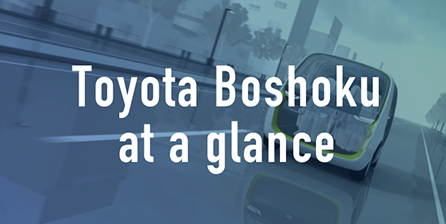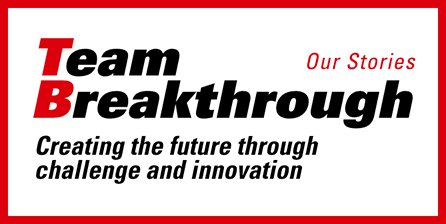Diversity and Inclusion
Basic stance
We are fostering an environment in which everyone, including women, seniors, non-Japanese members, people with disabilities, and young people, can freely and openly express their own ideas, through the creation of an open workplace culture. We believe that by fusing the knowledge possessed by such a diversity of human resources, this will energize innovation, resulting in business expansion as well as the creation of new businesses.
To create this open workplace, we conduct lectures and e-learning training for managers and others on harassment, compassionate communication, the importance of diversity and inclusion, and unconscious bias.
Work-life balance
Toyota Boshoku has been striving to improve the workplace environment in various ways. For example, at production sites, we have introduced production lines that make it easier for employees who are raising children to work, while in administrative and engineering workplaces, we have introduced flextime without core hours and teleworking systems. We have also established an infrastructure including setting up an in-house day care center and operating a day care center shared by the five Toyota Group companies, and have put in place systems such as an expanded shortened work hour system (raising the eligible age for use to 18 years old), and a system that allows leave to be taken for family care or fertility treatment reasons. We will further enhance flexible working rules and our office/IT environments so that our diverse human resources can work vibrantly and maximize their individual skills.
Initiatives to help support a healthy work-life balance


- A system for providing opportunities for job reinstatement to company members who apply for reinstatement, and are approved by the company. Applicable circumstances: company member previously left their job to provide caregiving, or was forced to relocate due to their spouse’s job transfer (inside and outside Japan.)
Users of childcare leave system and shortened work hour system [Toyota Boshoku]
Trend in the number of members using the childcare leave system and the utilization rate among men
| Fiscal year | Unit | 2020 | 2021 | 2022 | 2023 | 2024 | ||
|---|---|---|---|---|---|---|---|---|
| Number of members taking childcare leave and the utilization rate among men | Toyota Boshoku | Persons | 90 | 68 | 80 | 119 | 200 | |
| Women | Toyota Boshoku | Persons | 70 | 50 | 44 | 49 | 55 | |
| Men | Toyota Boshoku | Persons | 20 | 18 | 36 | 70 | 145 | |
| Utilization rate among men | Toyota Boshoku | % | - | 6 | 15 | 28 | 67 | |
The return to work rate for users of the childcare leave system is 100%.
Trend in members using the short working hour system
| Fiscal year | Unit | 2020 | 2021 | 2022 | 2023 | 2024 | ||
|---|---|---|---|---|---|---|---|---|
| Number of members using the short working hour system | Toyota Boshoku | Persons | 167 | 195 | 211 | 242 | 247 | |
| Women | Toyota Boshoku | Persons | 164 | 192 | 209 | 237 | 241 | |
| Men | Toyota Boshoku | Persons | 3 | 3 | 2 | 5 | 6 | |
Company member-led activity organizations
Employee Network Resources Group (ENRG)
In 2022, we established the Employee Network Resources Group (ENRG), a company member networking group to hear direct feedback from company members and pass this on to management to resolve issues. It is split into five groups: “Women,” “Young People,” “Non-Japanese Members,” “Seniors,” and “Persons with Disabilities.”
In 2023, five ENRGs took the lead in organizing D&I Week.
The program included experiencing what it is like to be a pregnant woman, a wheelchair experience, accounts of the experiences of members who had taken parental leave (men and women), introductions from groups for senior members and members with disabilities, and a panel discussion with a group of Boeing employees.
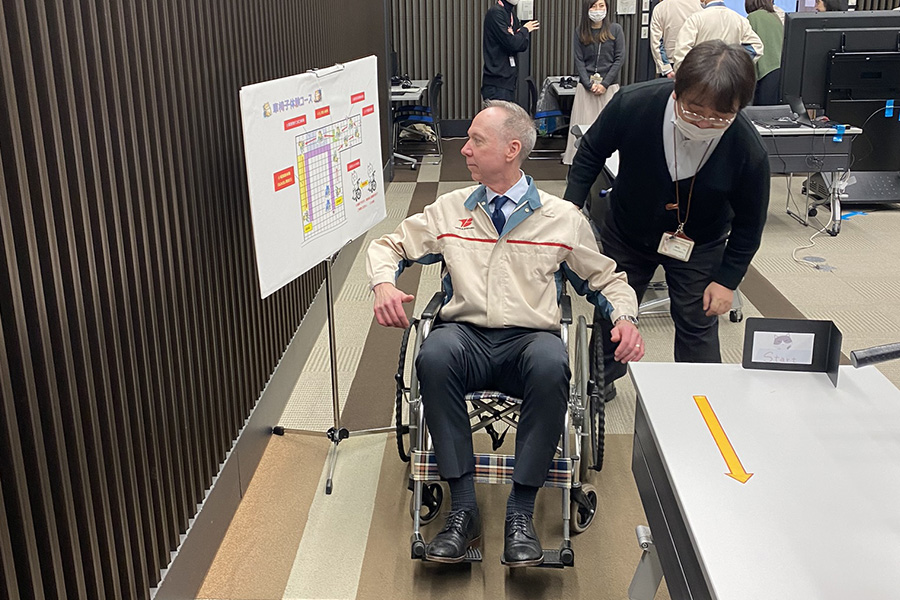
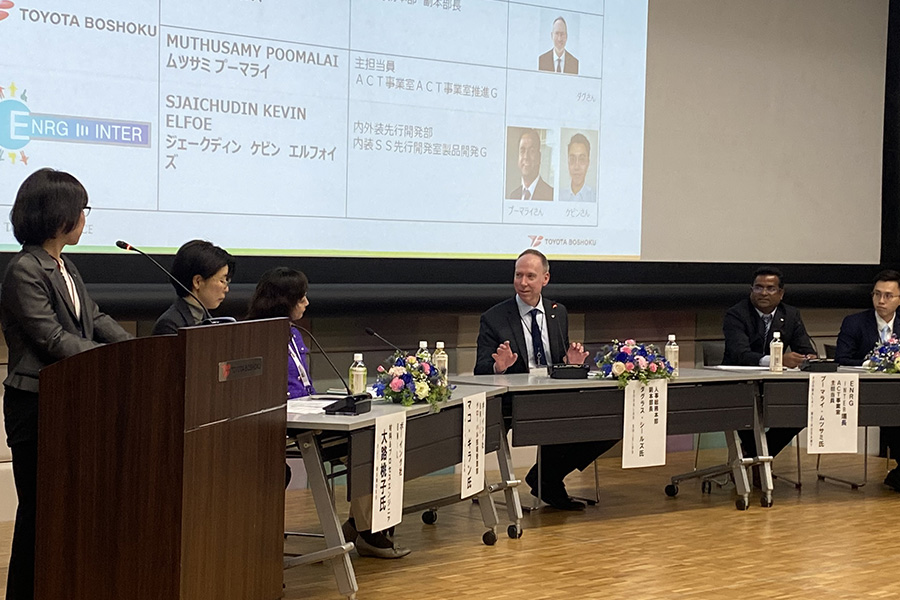
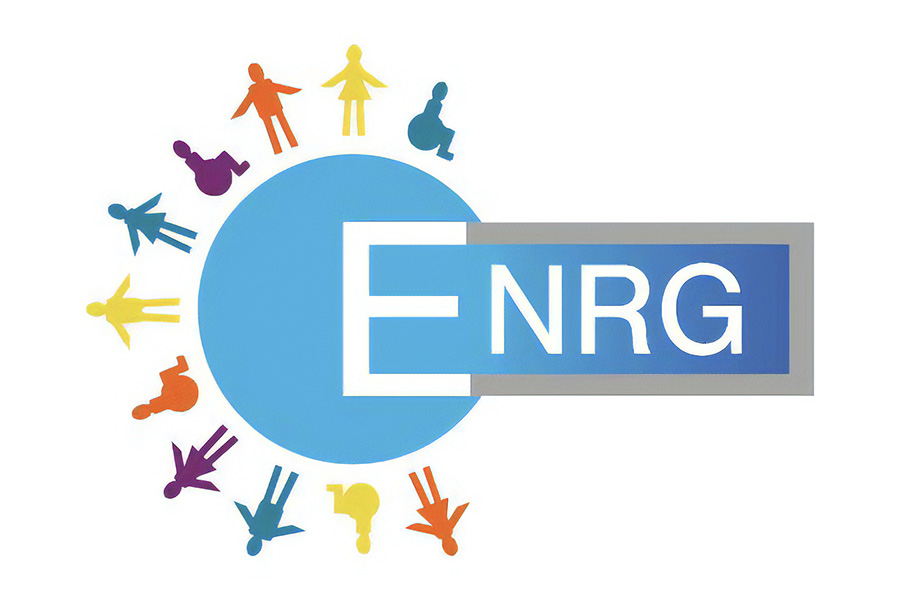
Promoting active roles for female members
We are striving to create a framework and workplace environment that is both satisfying and motivating and encourages continued service, through multifaceted support including improving the environment for career development and work-life balance, and changing the awareness of both female members and their supervisors.
We will continue to promote measures to encourage female managers and female technicians to play an active role, as well as actively recruit women.
Trend in the number of female managers [Toyota Boshoku]
Our goal is to expand women representation in management positions by 2030 to at least five times the number as of October 2014 (13).
| Fiscal year | 2020 | 2021 | 2022 | 2023 | 2024 |
|---|---|---|---|---|---|
| Number of female managers | 23 | 24 | 29 | 33 | 35 |
Registration and training of priority training individuals
In order to systematically develop each female company member from an early stage so that they can take on challenges and play an active role with a higher level of motivation, we register priority individuals for training, draw up individual training plans, and train them in each workplace.
From fiscal 2025, the company will accelerate the development of female company members by incorporating priority individuals for training into the NEXT100* program.
- Registration system for priority training individuals to strengthen the development of young people for the Toyota Boshoku group
Initiatives to advance women in skilled professions
We took this step to reflect the opinions of female employees in skilled profession into our workplace measures and to create an even more vibrant workplace.
From August 2020, we introduced regular daytime/first shifts (regular nighttime/second shifts) at workplaces, and in April 2024 we raised the eligible age in systems for reduced working hours. Any concerns and opinions regarding the workplace are also shared, as necessary, between each plant and HR, and further measures are then implemented.
Working Group for the Advancement of Women
The women’s group is active as “ENRG SHINE.”
To further encourage female company members to reach their potential at work, we hold seminars for supervisors, female members, and spouses in anticipation of returning to work after childcare leave, as well as unconscious bias training and a convention to promote the success of women in the company.
Employment of persons with disabilities
Toyota Boshoku is promoting the creation of a workplace environment in which people with various disabilities, including physical, hearing, visual, intellectual and mental disabilities, can work comfortably. Upon acceptance, orientation sessions are held at a special needs school and at the workplace to facilitate effective work after joining the company. We also make active use of services such as job coaches provided by government agencies.
Employment rate of persons with disabilities [Toyota Boshoku]
| Fiscal year | 2020 | 2021 | 2022 | 2023 | 2024 |
|---|---|---|---|---|---|
| Employment rate of persons with disabilities (%) | 2.21 | 2.33 | 2.45 | 2.53 | 2.54 |
Promotion of foreign nationals
In line with the progress of globalization, we are promoting further autonomy for each region. We also run global management training programs and human resource development committees to systematically train and assign executive candidates, as well as optimally assign—regardless of nationality—the many talented and capable company members we employ around the globe, including company members at sites outside Japan.
Ratio of local members who are executives in regions outside of Japan
| April 2020 | April 2021 | April 2022 | April 2023 | April 2024 | |
|---|---|---|---|---|---|
| Ratio of local employees (%) | 23 | 25.6 | 25.3 | 21.7 | 29.2 |
Promoting active roles through the recruitment and optimal allocation of human resources from a global perspective
We are promoting active roles for a wide diversity of talented people by accepting trainees from group companies outside Japan to Toyota Boshoku (Intra Company Transferee), embracing movement across regions and actively accepting and employing internships from universities outside Japan. In order to enable company members from other countries to play an active role, internal manuals in Japan have been translated into English, and Japanese language training and other programs have been implemented.
We are continuously implementing new measures in order to further facilitate active roles for a wide diversity of talented company members, and endeavor to keep improving in the future.
Responding to sexual diversity (LGBTQ + community)
We provide training for managers to promote understanding of sexual diversity, such as gender identity, sexual orientation, and gender expression. Furthermore, the company also provides an internal consultation service, which includes consultation on LGBTQ+, and has put in place an internal system for same-sex couples regarding marriage and family.
Moving forward, we will continue to create an environment where members of the LGBTQ + community can also work at ease, promote company members awareness and understanding activities, and foster a culture where all members are respected regardless of their sexuality.
Drawing on the expertise of older personnel
In 2004, Toyota Boshoku introduced a system for re-employing those who wish to work until the age of 65. We continue to implement various measures to provide a place where people can pass on their experience to future generations and make use of their skills and expertise even after retirement.
For example: our job posting system, which publicly advertises positions for company members over the age of 50, our policy of enabling retirement age flexibility for those in management positions, or our implementation of optional extensions of transfers to countries outside Japan.
We will continue implementing measures to enable talented senior company members to continue actively and dynamically engaging with their work. For example, by introducing systems that reward our talented company members over the age of 60 who continue to hold important responsibilities and produce good results, and by expanding such measures to include not just the company itself, but also our suppliers.
Reemployment of retirees [Toyota Boshoku]
| Fiscal year | 2020 | 2021 | 2022 | 2023 | 2024 |
|---|---|---|---|---|---|
| Reemployment of retirees (persons) | 314 | 343 | 354 | 392 | 425 |
Creating people-friendly processes and environments
We are designing people-friendly processes, systems and environments as well as educating managers and supervisors so that members with disabilities, female members and older personnel can work easily and vibrantly.


